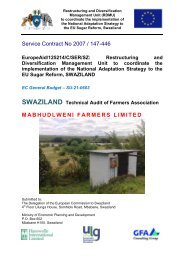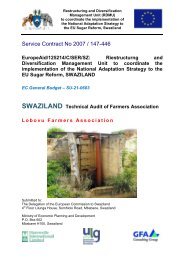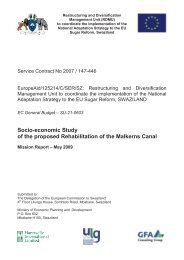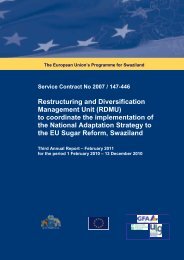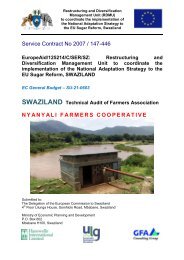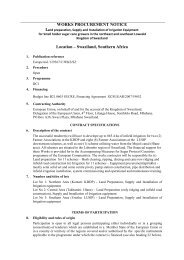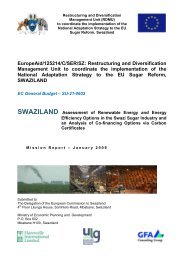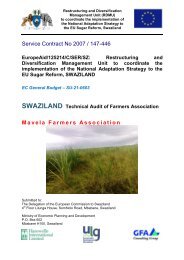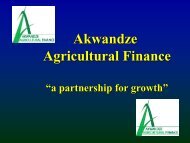Service Contract No 2007 / 147-446 Strategic ... - Swaziland
Service Contract No 2007 / 147-446 Strategic ... - Swaziland
Service Contract No 2007 / 147-446 Strategic ... - Swaziland
- No tags were found...
Create successful ePaper yourself
Turn your PDF publications into a flip-book with our unique Google optimized e-Paper software.
Piece of legislationUnited NationsFramework Conventionfor Climate Change(UNFCCC) (1992)United NationsConvention on BiologicalDiversity (CBD) (1992)United NationsConvention to CombatDesertification (UNCCD)Convention on Wetlandsof InternationalImportance especially asWaterfowl Habitat(Ramsar Convention)Description / relevance to the NASIt is quite unique that the Agreement contains an article on capacitybuilding (Article 14), acknowledging that the three countries must havesufficient human and institutional capacity to implement and monitor thisagreement. Consequently, the countries shall, individually and, whereappropriate, jointly, be responsible for ensuring that capacity is developedto effectively implement this Agreement.In terms of water quality, a resolution of the Tripartite PermanentTechnical Commission (TPTC) provides the following:Water quality will be managed in general within the parameters set for theresource quality that will consist of the: (a) quantity, pattern (seasonal andtemporal variation), water level and assurance of in-stream flow; (b) waterquality, including the physical, chemical and biological characteristics ofthe water; (c) character and condition of the in-stream and riparianhabitat; and (d) characteristics, condition and distribution of the aquaticbiota.The water quality management goals for the transboundary surface waterof the Incomati and Maputo watercourses for this period should: (a)ensure that existing aquatic ecosystems are protected; (b) allow for theabstraction for use in the production of drinking water after appropriatetreatment; (c) prevent significant adverse transboundary impacts; (d)prevent deterioration of the water quality of the watercourses; (e) beguided in general by water quality guideline values for the specific wateruse sectors; (f) at least conform to the values set for the parametersindicated in Appendix A (Short Term Water Quality Guidelines).United Nations framework Convention for climate change. <strong>Swaziland</strong> is anon-Annex I country, as such and also under the Kyoto Protocol (to theUNFCCC) it may benefit from the Clean Development Mechanism toreduce its carbon emissions. Certain obligations are posed on thecountry, such as keeping an inventory of GHGs. The UNFCCC is relevantto the NAS as climate change may have an impact on the viability ofsugar cane farming; as well the NAS foresees to explore the use of theCDM in the context of co-generation in the sugar mills.UN Convention whose main objectives are the conservation of biologicaldiversity, the sustainable use of its components and the fair and equitablesharing of the benefits arising out of the utilisation of genetic resources.<strong>Swaziland</strong> is signatory and the SEA is the Focal Point for the Convention.Recently <strong>Swaziland</strong> has prepared the 4 th National Report to the CBDSecretariat.UN Convention whose main objective is to combat desertification andmitigate the effects of drought. The Ministry of Agriculture andCooperatives is the Focal Point for this Convention. Currently <strong>Swaziland</strong>is completing a project aimed at reducing land degradation andbiodiversity loss in the Lower Usuthu River Basin area through applicationof sustainable land management practices.An intergovernmental treaty that provides the framework for nationalaction and international cooperation for the conservation and sound useof wetlands and their resources. The SNTC is the Focal Point for thisConvention.RDMU (<strong>Strategic</strong> Environmental Assessment of the National Adaptation Strategy) - Page 171



